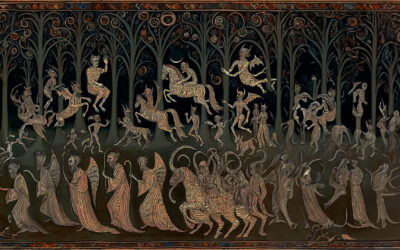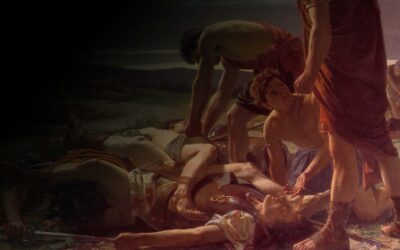Contents
Julius Caesar’s “the Gallic Wars” is not all about battles, troop movements, and strategy. There are many troop movements, yes, but there are also descriptions of places, people, leaders, and details in the cultures Caesar came to conquer. One such description is that of the Gallic druids.
Julius Caesar is one of history’s most prominent persons. Lawyer, military tribune, quaestor, pontifex maximus, governor, consul, and dictator. Warlord and reformer. The man had many strings on his lyre.
After having been consul of Rome, a consulship that he shared with Marcus Calpurnius Bibulus, Caesar spent nine years on military campaigns in the provinces of Gaul, Illyricum, and Transalpine Gaul (and on the unconquered lands bordering to these provinces).
It is about these campaigns that Caesar wrote in his De Bello Gallico. The work contains eight books where one book is more or less equivalent to one year’s campaigning. The last book was, however, most likely not written by Caesar at all.
Today, we will read chapters 13 and 14 from book 6 and the very famous passages about the Gallic druids.
This passage is not only famous because it features the Celtic druids, ever shrouded in mystery, but because it is the oldest detailed description of druids that we possess today. The druids themselves did not write anything down.
You will find the original Latin text below, along with an English translation. I hope that you will read with me!
If you want to learn more about Caesar and read/listen to more from De Bello Gallico – Check out Chapter 6 of our digital Anthology 2000 years of Latin Prose.
Video in Latin
Latin audio only
Listen to only the audio on your computer or your smartphone in your favorite podcast player:
Latin text (B.G. VI. 13–14)
Capitulum 13
1 In omnī Galliā eōrum hominum, quī aliquō sunt numerō atque honōre, genera sunt duo. Nam plēbēs paene servōrum habētur locō, quae nihil audet per sē, nūllō adhibētur cōnsiliō.
2 Plērīque, cum aut aere aliēnō aut magnitūdine tribūtōrum aut iniūriā potentiōrum premuntur, sēsē in servitūtem dicant nōbilibus: in hōs eadem omnia sunt iūra, quae dominīs in servōs.
3 Sed dē hīs duōbus generibus alterum est druidum, alterum equitum. 4 Illī rēbus dīvīnīs intersunt, sacrificia pūblica ac prīvāta prōcūrant, religiōnēs interpretantur: ad hōs magnus adulēscentium numerus disciplīnae causā concurrit, magnōque hī sunt apud eōs honōre.
5 Nam ferē dē omnibus contrōversiīs pūblicīs prīvātīsque cōnstituunt, et, 6 sī quod est admissum facinus, sī caedēs facta, sī dē hērēditāte, dē fīnibus contrōversia est, īdem dēcernunt, praemia poenāsque cōnstituunt; sī quī aut prīvātus aut populus eōrum dēcrētō nōn stetit, sacrificiīs interdīcunt. Haec poena apud eōs est gravissima.
7 Quibus ita est interdictum, hī numerō impiōrum ac scelerātōrum habentur, hīs omnēs dēcēdunt, aditum sermōnemque dēfugiunt, nē quid ex contāgiōne incommodī accipiant, neque hīs petentibus iūs redditur neque honōs ūllus commūnicātur.
8 Hīs autem omnibus druidibus praeest ūnus, quī summam inter eōs habet auctōritātem. 9 Hōc mortuō aut sī quī ex reliquīs excellit dignitāte succēdit, aut, sī sunt plūrēs parēs, suffrāgiō druidum, nōnnumquam etiam armīs dē prīncipātū contendunt.
10 Hī certō annī tempore in fīnibus Carnūtum, quae regiō tōtīus Galliae mediā habētur, cōnsīdunt in locō cōnsecrātō. Hūc omnēs undique, quī contrōversiās habent, conveniunt eōrumque dēcrētīs iūdiciīsque pārent. 11 Disciplīna in Britanniā reperta atque inde in Galliam trānslāta esse exīstimātur, 12 et nunc, quī dīligentius eam rem cognōscere volunt, plērumque illō discendī causā proficīscuntur.
Capitulum 14
1 Druidēs ā bellō abesse cōnsuērunt neque tribūta ūnā cum reliquīs pendunt; mīlitiae vacātiōnem omniumque rērum habent immūnitātem.
2 Tantīs excitātī praemiīs et suā sponte multī in disciplīnam conveniunt et ā parentibus propinquīsque mittuntur.
3 Magnum ibi numerum versuum ēdiscere dīcuntur. Itaque annōs nōnnūllī vīcēnōs in disciplīnā permanent.
4 Neque fās esse exīstimant ea litterīs mandāre, cum in reliquīs ferē rēbus, pūblicīs prīvātīsque ratiōnibus Graecīs litterīs ūtantur. Id mihi duābus dē causīs īnstituisse videntur, quod neque in vulgum disciplīnam efferrī velint neque eōs, quī discunt, litterīs cōnfīsōs minus memoriae studēre: quod ferē plērīsque accidit, ut praesidiō litterārum dīligentiam in perdiscendō ac memoriam remittant.
5 In prīmīs hoc volunt persuādēre, nōn interīre animās, sed ab aliīs post mortem trānsīre ad aliōs, atque hōc maximē ad virtūtem excitārī putant metū mortis neglēctō. 6 Multa praetereā dē sīderibus atque eōrum mōtū, dē mundī ac terrārum magnitūdine, dē rērum nātūrā, dē deōrum immortālium vī ac potestāte disputant et iuventūtī trādunt.
English Translation
Chapter 13
Throughout all Gaul there are two orders of those men who are of any rank and dignity: for the commonality is held almost in the condition of slaves, and dares to undertake nothing of itself, and is admitted to no deliberation.
The greater part, when they are pressed either by debt, or the large amount of their tributes, or the oppression of the more powerful, give themselves up in vassalage to the nobles, who possess over them the same rights without exception as masters over their slaves. But of these two orders, one is that of the Druids, the other that of the knights. The former are engaged in things sacred, conduct the public and the private sacrifices, and interpret all matters of religion. To these a large number of the young men resort for the purpose of instruction, and they [the Druids] are in great honor among them. For they determine respecting almost all controversies, public and private; and if any crime has been perpetrated, if murder has been committed, if there be any dispute about an inheritance, if any about boundaries, these same persons decide it; they decree rewards and punishments; if any one, either in a private or public capacity, has not submitted to their decision, they interdict him from the sacrifices. This among them is the most heavy punishment. Those who have been thus interdicted are esteemed in the number of the impious and the criminal: all shun them, and avoid their society and conversation, lest they receive some evil from their contact; nor is justice administered to them when seeking it, nor is any dignity bestowed on them. Over all these Druids one presides, who possesses supreme authority among them. Upon his death, if any individual among the rest is pre-eminent in dignity, he succeeds; but, if there are many equal, the election is made by the suffrages of the Druids; sometimes they even contend for the presidency with arms. These assemble at a fixed period of the year in a consecrated place in the territories of the Carnutes, which is reckoned the central region of the whole of Gaul. Hither all, who have disputes, assemble from every part, and submit to their decrees and determinations. This institution is supposed to have been devised in Britain, and to have been brought over from it into Gaul; and now those who desire to gain a more accurate knowledge of that system generally proceed thither for the purpose of studying it.
Chapter 14
The Druids do not go to war, nor pay tribute together with the rest; they have an exemption from military service and a dispensation in all matters. Induced by such great advantages, many embrace this profession of their own accord, and [many] are sent to it by their parents and relations. They are said there to learn by heart a great number of verses; accordingly some remain in the course of training twenty years. Nor do they regard it lawful to commit these to writing, though in almost all other matters, in their public and private transactions, they use Greek characters. That practice they seem to me to have adopted for two reasons; because they neither desire their doctrines to be divulged among the mass of the people, nor those who learn, to devote themselves the less to the efforts of memory, relying on writing; since it generally occurs to most men, that, in their dependence on writing, they relax their diligence in learning thoroughly, and their employment of the memory. They wish to inculcate this as one of their leading tenets, that souls do not become extinct, but pass after death from one body to another, and they think that men by this tenet are in a great degree excited to valor, the fear of death being disregarded. They likewise discuss and impart to the youth many things respecting the stars and their motion, respecting the extent of the world and of our earth, respecting the nature of things, respecting the power and the majesty of the immortal gods.
Translator. W. S. Bohn. 1869
















